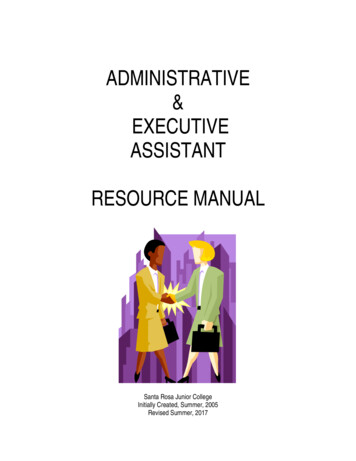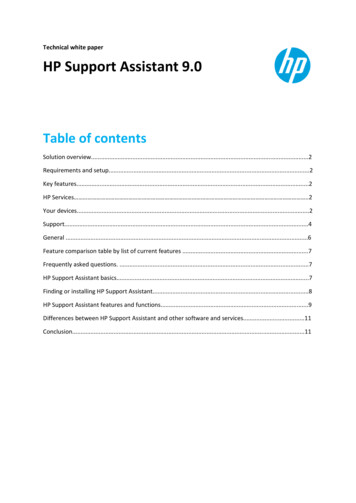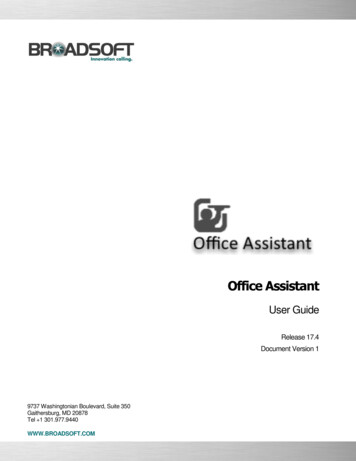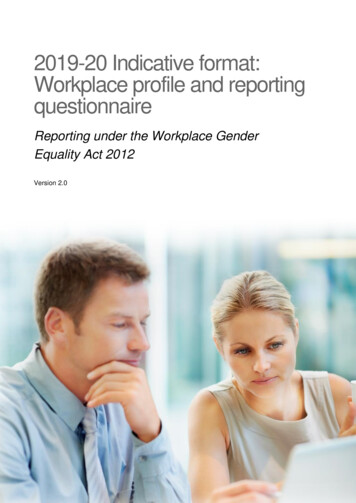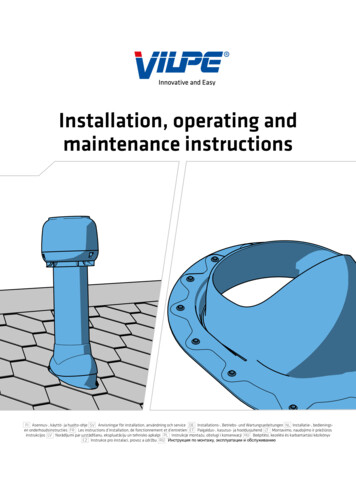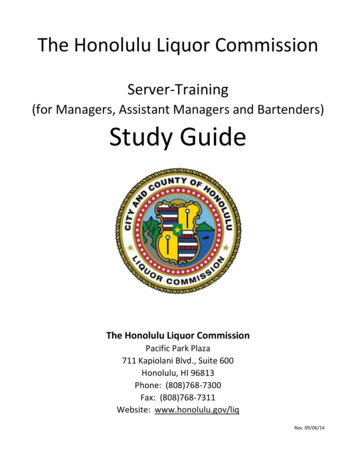
Transcription
The Honolulu Liquor CommissionServer-Training(for Managers, Assistant Managers and Bartenders)Study GuideThe Honolulu Liquor CommissionPacific Park Plaza711 Kapiolani Blvd., Suite 600Honolulu, HI 96813Phone: (808)768-7300Fax: (808)768-7311Website: www.honolulu.gov/liqRev. 09/06/14
Table of ContentsAboutUs . 1AlcoholOverview . . 2StudyGuide . 6I. Introduction 6II. Liquor Laws of Hawaii & Rules of the LiquorCommission Booklet . . 6III. Registration of Employees 8IV. Managers, Assistant Managers and Bartenders . 11V. Licensee/Employee Conduct 14VI. Enforcement 17VII. Improper Influence . 21VIII. Licensee Requirements . 21IX. Licensee Display Requirements . 23X. Dangers of Driving While Intoxicated 26XI. Identifying and Dealing with Intoxicated Persons 27Addendum to Server Training Study Guide . . 29Select Laws and Rules in their entirety as discussed inServer-Training
About UsThe Honolulu Liquor CommissionOur Mission: To promote our community’s health, safety,and welfare by efficiently and fairly administering andenforcing Hawaii’s liquor laws.The Honolulu Liquor Commission (HLC), authorized byChapter 281 of the Hawaii Revised Statutes employslicensing, training, auditing, enforcement and administrativepersonnel to meet the mission objectives of the agency.HLC works to keep our communities safer by regulating thesale and service of liquor. HLC offers training to Licensees,Managers, Bartenders and others who serve liquor to provideeducation on the Liquor Laws of the State of Hawaii and theRules of the City and County of Honolulu Liquor Commission.There are five (5) citizen commissioners who set policy for theHLC. They meet weekly to make decisions on liquor licensesand case hearings. Commissioners are appointed by theMayor and are subject to City Council confirmation.1
Alcohol OverviewWhat is alcohol? Alcohol is a colorless, volatile flammableliquid that is the intoxicating constituent of wine, beer,spirits, and other drinks, and is also used as an industrialsolvent as fuel. Liquor contains one-half of one percent ormore of alcohol by volume used for beverage purposes.The following information regarding alcohol is taken from theNational Institute on Alcohol Abuse and Alcoholism. Additionalinformation can be found on www.niaaa.nih.govOverview of Alcohol ConsumptionAlcohol’s effects vary from person to person, depending on avariety of factors, including: How much you drink How often you drink Your age Your health status Your family history Size of a person GenderDrinking alcohol in small amounts may not necessarily be aproblem. Drinking alcohol in excess may cause a range ofconsequences and potential health risks.2
Consequences of drinking too muchAlcohol enters your bloodstream as soon as you take yourfirst sip. Alcohol’s immediate effects can appear within about10 minutes. As you drink, you increase your Blood AlcoholConcentration (BAC) level, which is the amount of alcoholpresent in your bloodstream. A BAC of .08% is consideredlegal intoxication in the State of Hawaii.The higher your BAC, the more impaired you become byalcohol’s effects. These effects can include: Reduced inhibitions Slurred speech Motor impairment Confusion Memory problems Concentration problems Coma Breathing problems DeathOther risks of drinking can include: Car crashes and other accidents Risky behavior Violent behavior Suicide and homicide3
People who drink too much over a long period of time mayexperience alcohol’s longer-term effects, which can include: Alcohol dependence, addiction Health problems Increased risk for certain cancersHow does alcohol affect the human body?Brain: Alcohol interferes with the brain’s communicationpathways, and can affect the way the brain (looks and) works.These disruptions can change mood and behavior, and makeit harder to think clearly and move with coordination.Heart: Drinking a lot over a long time or too much on a singleoccasion can damage the heart, causing problems including: Cardiomyopathy – Stretching and drooping of heartmuscle Arrhythmias – Irregular heart beat Stroke High blood pressureLiver: Heavy drinking takes a toll on the liver, and can lead toa variety of problems and liver inflammations including: Steatosis, or fatty liver Alcoholic hepatitis Fibrosis and Cirrhosis4
Pancreas: Alcohol may cause the pancreas to produce toxicsubstances that can eventually lead to pancreatitis, adangerous inflammation and swelling of the blood vessels inthe pancreas that prevents proper digestion.Cancer: Drinking too much alcohol can increase your risk ofdeveloping certain cancers, including cancers of the: Mouth Esophagus Throat Liver BreastImmune System: Drinking in excess can weaken yourimmune system, making your body a much easier target fordisease. Chronic drinkers are more liable to contract diseaseslike pneumonia and tuberculosis than other people who donot drink heavily. Drinking a lot on a single occasion slowsyour body’s ability to ward off infections – even up to 24hours after being intoxicated.5
Study GuideI. IntroductionThe Server-Training Study Guide will help prepare you for therequired Honolulu Liquor Commission Manager/AssistantManager and Bartender Server-Training course. It is arequirement for all employees to be familiar with the LiquorLaws of Hawaii and the Rules of the Liquor Commission. Thisstudy guide will focus some important laws and rules thatmay impact you while on the job.After reading the provided information, you will gainunderstanding in the following areas:1. Identifying and dealing with intoxicated persons,2. Reviewing liquor laws and rules, and3. Dangers of driving while intoxicatedII. Liquor Laws of Hawaii and Rules of the LiquorCommission (booklet) All employees must be familiar with the Liquor Laws ofHawaii and the Rules of the Liquor Commission§3-82-38.1. Every licensee (except special licenses, transient vesselper day, and caterer) shall have a current copy of the6
statutes relating to intoxicating liquor and the rules ofthe Commission in English available at all times on thelicensed premises. Customers shall be entitled toexamine the statutes and rules upon request andemployees must know where the booklet is located.§3-82-38.2. Chapter 281 of the Hawaii Revised Statues (HRS) consistsof the Hawaii State Liquor Laws identified by §281. Honolulu Liquor Commission Rules are identified by §3. Updated HRS and Rule Amendments implemented onSept. 1, 2014 may be obtained from our website atwww.honolulu.gov/liqThroughout this study guide, we will refer to the State Lawsfrom Chapter 281 of the Hawaii Revised Statutes and theHonolulu Liquor Commission Rules. Please refer to the LiquorLaws of Hawaii & Rules of the Liquor Commission (currently, ayellow booklet) for the complete text of the law and/or rulebeing discussed. The laws and rules are listed numerically inseparate sections of the booklet.7
The laws and rules are also available on our website atwww.honolulu.gov/liqIII. Registration of EmployeesAnyone applying for their Certificate of Registration (liquorcard) must provide the following:1) Valid government issued photo ID (driver’s license,state ID, military ID, passport, etc.);2) Proof of Social Security Number (Social Security Cardor Original W-2);3) Tuberculosis (TB) clearance report (with a negativereading less than 10 mm);4) Required for Managers and Assistant Managers only A letter from the employer certifying that the applicantwill be or is a manager of the licensed premises.8
If you have previously obtained a Honolulu LiquorCommission Certificate of Registration (liquor card), youmay only be required to provide the following: Valid government issued photo ID (driver’s license,state ID, military ID, passport, etc.); Manager/Assistant Manager letter certifying that theapplicant will be or is a manager of the licensedpremises. Certificates of Registration (liquor cards) are only validfor the licensed premises for which the employeeregisters and the license number of the premises.Restaurants, dispensers (bars), hotels, cabarets, andother liquor establishments with multiple locationsrequire separate liquor cards for each licensed premises§3-82-38.5(b). Retail Store licensees require only one (1) Certificate ofRegistration (liquor card) for multiple locations of thesame company §3-82-38.9 (c). Certificates of Registration (liquor cards) for employees,except for dancers, shall be valid for four (4) years fromthe date of issue §3-82-38.5(b).9
The Certificate of Registration (liquor card) card shall beretained by each employee and not surrendered to orheld by the employer§3-82-38.5(d). Licensees shall ensure that all employees who arerequired to register with the Commission have theirCertificate of Registration for the licensed premisesreadily available for inspection while on duty at thatlicensed premises §3-82-38.5 (e).There are five (5) types of Certificate of Registration cards(liquor cards). Each identified by color.1) Blue: Manager and Assistant Manager2) Yellow: Bartender, Bar Backs, Wait Staff, Hostess/Host,Door Person/Bouncer3) Red: Minors ages 18-204) Green: Dancer5) Purple: RetailAll dispenser, cabaret, hotel, club, brewpub, or condominiumhotel licenses shall employ persons in that section of thelicensed premises where liquor is sold, served or consumedwho are registered with the Commission prior to the start ofemployment. For restaurant licenses (license numbers thatbegin with “R”) only managers/assistant managers andbartenders are required to be registered prior to the start ofemployment.10
IV. Managers/Assistant Managers and Bartenders Managers and Bartenders are required to be registeredwith the Commission prior to working and mustsuccessfully complete the server-training program andpass the examination. The server-training program is valid for four (4) years§3-82-38.5(f). Licensee must have a registered manager in activecharge of the licensed premises during the time theestablishment is licensed to sell or serve liquor§3-82-38.9(h). Certificates of Registration (liquor cards) for employees(except for dancers) shall be valid for four (4) years fromthe date of issue §3-82-38.5(b). Managers and must be at least 21 years of age§3-82-38.9(e). Managers may perform any other duties (i.e. bartender,bar back, wait tables, seat customers) except may not bea dancer §3-82-38.6(c). Managers may obtain a separate Certificate ofRegistration (liquor card) for dancer and perform as adancer when not on duty as a manager.11
Managers of licensed hostess bars are permitted to sitwith customers during hours of operation. Registeredmanagers and waitresses in licensed cabarets (Class 11,liquor license hours of 10:00 am to 4:00 am) are notpermitted to sit with customers during hours ofoperation §3-84-78.01(c). Managers (like all other employees) may not consumeliquor while on duty §3-84-78.01(b). Bartenders must be at least 18 years of age and properlysupervised §281-78(b)(3). In general, bartenders prepare or mix alcoholic drinks,receive payments and are responsible for the cleanlinessand orderly condition of the bar area §3-80-1.1 definitions. Bartenders may perform all duties (i.e. bar back, waittables, seat customers) except they may not perform theduties of a manager and/or dancer. §3-82-38.6(c). Bartenders may not sit with customers §3-84-78.01(d). Bartenders (like all other employees) may not consumeliquor while on duty §3-84-78.01(b). Retail Managers (managers who work at grocery stores,liquor stores, convenience stores, club type stores, drugstores, etc.) must be registered with the Commission andbe at least 21 years of age.12
Retail Managers need not be on the premises at all timesbut shall be responsible for training and monitoring theirassigned stores §3-82-38.9(a)(2). Retail Managers shall complete the server-trainingprogram and pass the examination prior to beingassigned those duties §3-82-38.9(a)(2). Retail Managers shall ensure that cashiers are at least 21years of age. If the cashier is 18-20 years of age, theymust be properly supervised § 281-78(b)(3). Retail Managers must also ensure no consumption ofalcohol by employees or customers is done on thepremises §281-78(b)(2). Retail Managers Certificates of Registration (liquor cards)allow for multiple premises if ownership has multipleproperties §3-82-38.9(a)(2). It is the responsibility of the Licensee, Managers andAssistant Managers to ensure all employees are followingthe Liquor Laws of Hawaii and the Rules of the LiquorCommission.13
V. Licensee/Employee Conduct Licensees shall be strictly accountable for the conduct ofall employees on the licensed premises. An employee is defined as any person who performs aservice usually or normally done, on or within a licensedpremises, regardless of whether that person is undercontract of commission, registered or not registered,compensated or not compensated, and shall be subjectto the constraints of these rules and shall be consideredan on duty employee of the licensee §3-84-78.01 (a). No employee while on duty shall consume liquor§3-84-78.01 (b). No employee while on duty shall solicit or accept anyfood or beverage, alcoholic or otherwise, as a gift from orat the expense of a customer §3-84-78.01 (c). Only registered hostesses and managers of licensedhostess bars are permitted to sit with customers duringhours of operation.Registered managers and waitresses in cabarets (Class11, open 10:00 am – 4:00 am) are not permitted to sitwith customers during hours of operation§3-84-78.01 (c).14
Time Cards Time cards are required for all employees who handle,serve, or sell liquor §3-82-38.4 (a). Time cards must be inEnglish and include the employee’s first and last name(no nicknames), must state if he or she is a minor (under21 years of age), and must include the month, day, yearand time while on duty. Time record entries shall be made at the time theemployee reports on duty and again when the employeegoes off duty. If the employee is a minor, the licenseeshall print on the time record below the employee’sname that said employee is a minor. Employee timerecords shall be preserved for at least six months§3-82-38.4 (b). Electronic or otherwise recorded payroll registration maybe used for the purposes of this rule with theAdministrator’s approval §3-82-38.4(c).Stacking of Drinks §3-84-78.52Employees serving liquor should be mindful of not overserving liquor to customers. Stacking is defined as havingmore than two standard servings of drinks before a customerat any one time. Standard servings as follows: Distilled Spirits - 16 ounces Wine - 6 ounces15
Beer - 22 ouncesIf the serving is in excess of these amounts, the customershall be limited to one drink. A multi-serving container, notto exceed 60 ounces, may be served to two or more persons.At last call, multiple-serving container service or any drinkexceeding a single standard serving shall be prohibited.Obstructing Commission Operations No Licensee shall allow the obstruction, hampering, orinterfering with investigations and inspections or LiquorCommission operations in any way, including by notlimited to, the sounding of alarms, flashing of lights oruse of a public address system or other advance warningannouncing the arrival of Commission investigators§3-84-79.1.Practices to Promote Consumption of Liquor, Prohibited. No Licensee of any premises licensed to sell liquor forconsumption on the premises shall §3-84-75.51:1. Sell, advertise or offer to sell “all the liquor you candrink” for a fixed price.2. Encourage or permit any game or contest thatinvolves the consumption of liquor or the awardingof liquor as a prize.16
VI. EnforcementLiquor Commission Investigators visit Licensees to enforce theLiquor Laws of Hawaii and the Rules of the LiquorCommission. Licensees and employees shall not allow theobstruction, hampering, or interfering with investigations andinspections or Liquor Commission operations in any way,including but not limited to, the sounding of alarms, flashingof lights or other to provide advance warning announcing thearrival of Commission investigators §3-84-79.1.Complaint and SummonsA Complaint and Summons may be issued if any personviolates Chapter 281 or any rule or regulation in effect byauthority of this chapter, whether in connection therewith apenalty is referred to or not, for which violation no penalty isspecifically prescribed, the person shall be imprisoned notmore than six months or fined not more than 1,000, or both§281-102.17
Sample Complaint and SummonsSAMPLEONLY18
Notice of ViolationA Notice of Violation may be issued to a Licensee should theybe in violation of a City and County of Honolulu LiquorCommission Rule. The Licensee (owner/representative) mustappear at an adjudication hearing before the LiquorCommission where it will be determined if the violationsustained Licensee will pay a reprimand fine, or whetherthere be a restriction, suspension, or revocation of the liquorlicense.19
Sample Notice of ViolationSAMPLEONLY20
VII. Improper InfluenceAny licensee, employee of a licensee or its agent who shallgive, pay, or offer directly or indirectly any pecuniary benefitto any Liquor Commission investigator or staff member withthe intent to influence the investigator or staff member in thedischarge of any duty herein provided for, shall be guilty of aviolation §3-84-79.2 (a).Any licensee, employee of a licensee or its agent who solicits,accepts, or agrees to accept, directly or indirectly, anypecuniary benefit with the intent that such person’sjudgment, exercise of discretion, or other action as regards tocompliance with any liquor law or Rules will thereby beinfluenced, shall be guilty of a violation §3-84-79.2 (b).VIII. Licensee RequirementsA licensee shall be authorized to sell or serve alcohol andliquor based upon its class of license during the hoursspecified as follows §3-82-38.19:1) Dispenser (Bar), Club, Restaurant, Brewpub, Caterer,Vessel, Transient Vessel, Tour or Cruise Vessel, andSpecial - From 6:00am to 2:00am the following day.2) Cabaret - From 10:00am to 4:00am the following day.3) Retail - From 6:00am to 12 midnight.21
4) Manufacturer and Wholesaler - 24 Hours a day.5) Hotel - From 6:00am to 4:00am the following day.6) Temporary - The hours of the class of the license forwhich the license has been submitted.7) Condominium Hotel - From 6:00am to 2:00am thefollowing day. No sale, service or consumption of liquor on or within thelicensed premises shall be provided before or after thehours established by the Commission §3-82-38.20 (a). No liquor, whether in a bottle, glass or other container,shall be open and readily consumable within the licensedpremises before or after the authorized hours§3-82-38.20 (b). A drink shall contain not less than one fluid ounce ofliquor unless the customer requests the drink be mixedwith a lesser amount of liquor §3-84-73.1. It shall be unlawful for any retail licensee (Class 2 or Class4 through Class 14 license), except a Class 10 licensee, topurchase, acquire, or sell liquor from any person otherthan a licensed wholesaler §281-31(s).22
IX. Licensee Display RequirementsAll licensees must have the following items visibly displayedat the licensed premises.1) Liquor Commission License §281-712) Liquor price list - menu, table tent, sign §3-82-38.113) “It is Illegal” – Under 21 laws §3-82-44.1(c)4) “Be Aware” – Penalties of Driving Under the Influence§3-82-44.1(d)Sample 2013 Liquor Commission License23
“It is Illegal” – Laws regarding minors under 21Sections 281-78 and 281-101.5, Hawaii Revised Statues24
“Be Aware” – Penalties for Driving Under the Influence25
X. Dangers of Driving While IntoxicatedDriving under the influence (DUI) is against the law and noperson(s) should be driving a vehicle or operating heavymachinery while intoxicated.Alcohol impairs normal function and affects people’s vision,coordination, judgment, reaction time and reflexes. Theseimpairments make it difficult for anyone to drive safely.The person driving while intoxicated may cause a seriousaccident and statistics show many DUI related accidents canbe fatal.Help keep your customers safe, the roads safe and ourcommunity safe. Don’t over-serve your customers, observethem and obey the Laws and Rules of selling and servingliquor.Four (4) types of people you cannot sell or serve liquor to.1) Minor (under age 21)2) Under the Influence3) Addicted to Alcohol4) Purchasing for a MinorBe aware that your customers may have been consumingliquor prior to entering your establishment.26
Customers under the influence may not enter or remain onyour premises even if they stop drinking liquor §281-78 (b)(5).You may not sell, serve, furnish liquor, or allow consumptionof any liquor by anyone under the influence of liquor§281-78 (b)(1)(B).XI. Identifying and Dealing with Intoxicated PersonsSome common signs of intoxication include:1) Red flushed face, blood shot eyes2) Vomiting3) Talking loudly, being disorderly4) Slurred or slowed speech5) Uncoordinated6) Sudden mood changes7) Staggers, sways, has difficulty walking8) SleepyEmployees should be familiar with the signs of intoxicationand know what action(s) to take when dealing with anintoxicated person.Here are three (3) examples of customers under the influencewho require proper attention. How would you assist thesepeople?27
1) Customer has slurred speech, seems uncoordinated, andappears sleepy with bloodshot eyes.2) Customer is belligerent, disorderly and starts a fight.3) Customer is found in the restroom disoriented, vomitingand unresponsive.What would you do and who would you call under thesecircumstances?We encourage employers to establish policies and proceduresto better prepare themselves to assist customers who may beintoxicated. Employees should be trained on how to handlethe example situations mentioned and should be familiarwith providing documentation and completing an incidentreport.28
Addendum to Server Training Study GuideLaws and Rules as discussed in server training(for Managers & Bartenders)Cited from the Liquor Laws of Hawaii & Rules of the Liquor Commission bookletChapter 281, Hawaii Revised Statutes (HRS)State Liquor Laws§281-1 Definitions. Whenever used in this chapter, unlessotherwise apparent from the context: “Addicted to the excessive use of intoxicating liquor”refers to one who has acquired the habit of usingintoxicating liquor excessively to deprive oneself ofreasonable self-control, a common drunkard, or ahabitual drunkard. “Alcohol” means the product of distillation of anyfermented liquid, whether rectified or not, whatever maybe the origin thereof, and includes synthetic ethylalcohol, but not denatured or other alcohol which isconsidered nonpotable under the customs laws of theUnited States. “Licensee” includes also all agents, servants, andemployees of the holder of a license.29
"Premises" or "licensed premises" means the buildingand property that houses the establishment for which alicense has been or is proposed to be issued; providedthat in the case of class 12 hotel license, "premises"includes the hotel premises; provided further that in thecase of a class 15 condominium hotel license, "premises"includes units, as defined in section 514B-3, that are usedto provide transient lodging for periods of less than thirtydays under a written contract with the owner or ownersof each unit in, and common elements for accesspurposes as established by the declaration ofcondominium property regime of, the condominiumhotel; and provided further that if an establishment is ina retail shopping complex the businesses of which haveformed a merchants association, "premises" means theestablishment. As used in this definition,"establishment" means a single physical location wherethe selling of liquor takes place.§281-31 Licenses, classes.(a) Licenses may be granted by the liquor commission asprovided in this section.(b) Class 1. Manufacturers’ licenses. A license for themanufacture of liquor shall authorize the licensee to:30
(1) Manufacture the liquor therein specified;(2) Sell it in original packages to any wholesaler whoholds a license to resell it; and(3) Sell beer, wine, or other specified liquormanufactured or distilled on the licensee’s premisesfrom fruits or other products grown in the State, in anyquantity:(A) At wholesale in original packages to any personwho holds a license to resell it; and(B) To any person for private use and consumption.Under this license, no liquor shall be consumed on thepremises except as authorized by the commission. Of thisclass, there shall be the following kinds:(1) Beer;(2) Wine;(3) Alcohol; and(4) Other specified liquor.It shall be unlawful for any holder of a manufacturer’slicense to have any interest whatsoever in the license orlicensed premises of any other licensee. This subsection shallnot prevent the holder of a manufacturer’s license under thischapter or under the law of another jurisdiction from31
maintaining any interest in the license or licensed premises ofa wholesale dealer licensee under this chapter.(c) Class 2. Restaurant licenses.(1) A license under this class shall authorize thelicensee to sell liquor specified in this subsection forconsumption on the premises; provided that arestaurant licensee, with commission approval, mayprovide off-premises catering of food and liquor;provided further that the catering activity shall bedirectly related to the licensee’s operation as arestaurant. A licensee under this class shall be issued alicense according to the category of establishment thelicensee owns or operates. The categories ofestablishment shall be as follows:(A) A standard bar; or(B) A premises in which live entertainment orrecorded music is provided. Facilities for dancingby the patrons may be permitted as provided bycommission rules.(2) If a licensee under class 2 desires to change thecategory of establishment the licensee owns oroperates, the licensee shall apply for a new license32
applicable toestablishment.thecategoryofthelicensee’s(3) Of this class, there shall be the following kinds:(A) General (includes all liquor except alcohol);(B) Beer and wine; and(C) Beer.Notwithstanding section 281-57, the commission mayapprove at one public hearing and without notice the changeto a class 2 restaurant license of a licensee holding a class 5dispenser license who meets the requirements of a class 2license.(d) Class 3. Wholesale dealers’ licenses. A license for thesale of liquor at wholesale shall authorize the licensee toimport and sell only to licensees or to others who are by lawauthorized to resell the liquor specified by the license but arenot by law required to hold a license; provided that a class 3licensee may sell samples of liquor back to the manufacturer.Under a class 3 license, no liquor shall be consumed on thepremises except as authorized by the commission. Of thisclass, there shall be the following kinds:(1) General (includes all liquor except alcohol);(2) Beer and wine; and(3) Alcohol.33
If any wholesale dealer solicits or takes any orders in anycounty other than that where the dealer’s place of business islocated, the orders may be filled only by shipment direct fromthe county in which the wholesale dealer has the dealer’slicense. Nothing in this subsection shall prevent a wholesalerfrom selling liquor to post exchanges, ships’ service stores,army or navy officers’ clubs, or similar organizations locatedon army or navy reservations, or to any vessel other thanvessels performing a regular water transportation servicebetween any two or more ports in the state, or to aviationcompanies who operate an aerial transportation enterprisesubject to chapter 269 and engaged in regular flightpassenger services between any two or more airports in thestate for use on aircraft, or aviation companies engaged intranspacific flight operations for use on aircraft outside thejurisdiction of the State.(e) Class 4. Retail dealers’ licenses. A license to sell liquorat retail or to class 10 licensees shall authorize the licensee tosell the liquor therein specified in their original packages.Under a class 4 license, no liquor shall be consumed on thepremises except as authorized by the commission. Of thisclass, there shall be the following kinds:(1) General (includes all liquor except alcohol);(2) Beer and wine; and34
(3) Alcohol.(f) Class 5. Dispensers’ licenses.(1) A license under this class shall authorize thelicensee to sell liquor specified in this subsection forconsumption on the premises. A licensee under thisclass shall be issued a license according to the categoryof establishment the licensee owns or operates. Thecategories of establishments shall be as follows:(A) A standard bar;(B) A premise in which a person performs orentertains unclothed or in attire restricted to useby entertainers pursuant to commission rules;(C) A premise in which live entertainment orrecorded music is provided; provided that facilitiesfor dancing by the patrons may be permitted asprovided by commission rules; or(D) A premise in which employees or entertainersare compensated to sit with patrons, regardless ofwhether the employees or entertainers areconsuming nonalcoholic beverages while in thecompany of the patrons pursuant to commissionrules.35
(2) If a licensee under class 5 desires to change thecategory of establishment the licensee owns oroperates, the licensee shall apply for a new licenseapplicable to the category of the licensee’sestablishment.(3) Of this class, there shall be the following kinds:(A) General (includes all liquor
Sep 06, 2014 · The Server-Training Study Guide will help prepare you for the required Honolulu Liquor Commission Manager/Assistant Manager and Bartender Server-Training course. It is a requirement for all employees to be familiar with the Liquor Laws of Hawaii and the Rules of the Liquor Commission. This study gui



